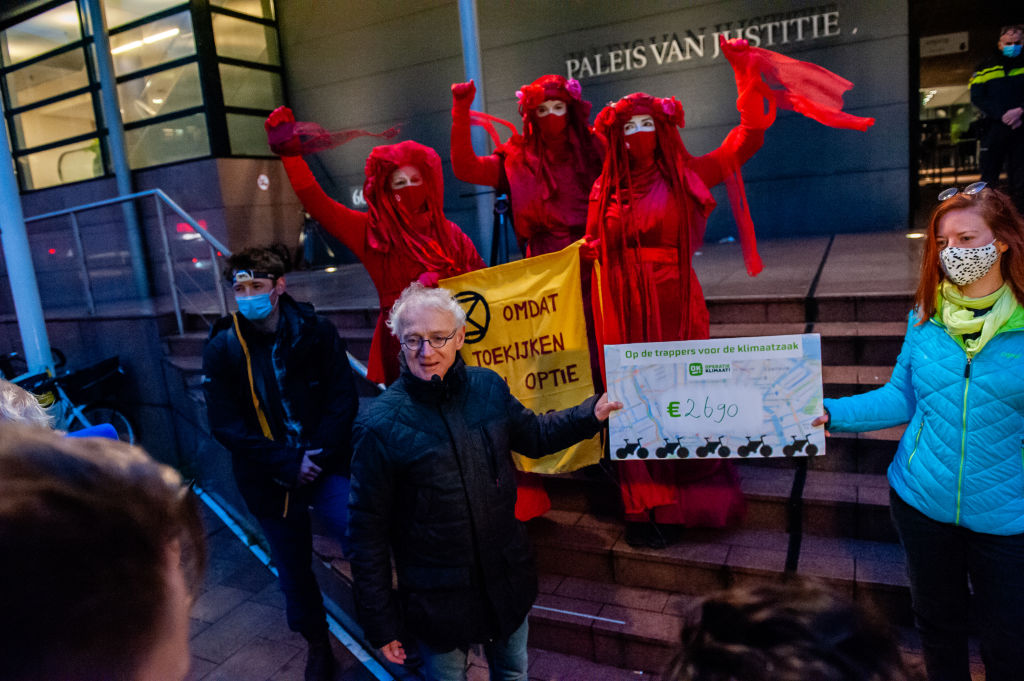
In the course of my reporting, I’m constantly trying to identify the surprising links between the news of the day and climate change. I have to admit: Former President Donald Trump’s indictment is clearly this week’s biggest headline, and it’s hard to see a clear link to climate.
Part of that challenge is the specific nature of his alleged crime—falsifying business records. But there’s another reason why it can be hard to connect this week’s news to climate change: the law is ill-equipped to address climate change. Interpretation of the law is built on precedent. Climate change, much like Donald Trump, is unprecedented. So instead of lingering on Trump, I’m going to use this week’s newsletter to explore why the law has been so slow to recognize climate change and the growing efforts to make climate a part of legal considerations.
Every country has its own legal system with its own particularities, but I think it’s helpful to start by looking at U.S. federal law. The U.S. federal code is composed of thousands of pages of laws. It’s somewhat obvious, but the vast majority of these laws, including many landmark ones, were crafted at a time when climate change was decades away from entering the lexicon. This creates big legal challenges as the federal government tries to incorporate climate into its work.
A version of this story also appears in the Climate is Everything newsletter. To sign up, click here.
Take the Securities and Exchange Commission (SEC). The SEC is trying to regulate climate risk in publicly-traded companies, but the laws that govern its work were enacted in the 1930s. Even laws that might seem well suited for climate change, like the Clean Air Act, face tough legal challenges because judges struggle with incorporating climate into their consideration of the law. And that’s to say nothing about the U.S. Constitution, which was written in the 18th century and last amended in 1992.
Updating these laws to explicitly incorporate climate change is not likely in today’s divided Washington. That’s where a new crop of activists and lawyers come in. In recent years, a growing group has sought to push the envelope with litigation that seeks to infuse climate into how we interpret existing laws. They’re doing this by filing hundreds of climate-related claims in state and federal courts using existing law with no obvious connection to climate. The goal is to force courts to consider those laws in a new light.
The tests have seen mixed results, and many remain skeptical. But there are some green shoots. One bright spot for climate-court watchers is a group of youth plaintiffs suing the state of Montana arguing that the state is violating their constitutional “right to a clean and healthful environment” by supporting fossil fuels. The case goes to trial in June and it will be one of the first times the merits of acting on climate change gets a full hearing in court.
The global picture is much more complicated. Some countries with forward-thinking legislators, including many European countries, have actually enacted laws that codify the need to act on climate and meet stringent emissions-reduction targets. Those laws have been the basis for lawsuits demanding that countries and governments do more on the issue with at least one success in the Netherlands.
But in many more places the law remains pretty silent on climate change. And so an effort has sprouted up pushing to change that from the top down. Led by the island nation of Vanuatu, more than 160 countries voted last week to call on the International Court of Justice, the U.N.-affiliated international court which settles disputes between countries, to issue an advisory opinion addressing what responsibilities countries have to address climate change. “We’ve targeted the ICJ because in terms of all courts, in all jurisdictions at all levels, it sets the most pervasive precedent,” Ralph Regenvanu, Vanuatu’s climate minister, told me last year.
It’s exactly because climate change is unprecedented that such a precedent would make such a big difference.
More Must-Reads From TIME
- The 100 Most Influential People of 2024
- The Revolution of Yulia Navalnaya
- 6 Compliments That Land Every Time
- What's the Deal With the Bitcoin Halving?
- If You're Dating Right Now , You're Brave: Column
- The AI That Could Heal a Divided Internet
- Fallout Is a Brilliant Model for the Future of Video Game Adaptations
- Want Weekly Recs on What to Watch, Read, and More? Sign Up for Worth Your Time
Write to Justin Worland at justin.worland@time.com